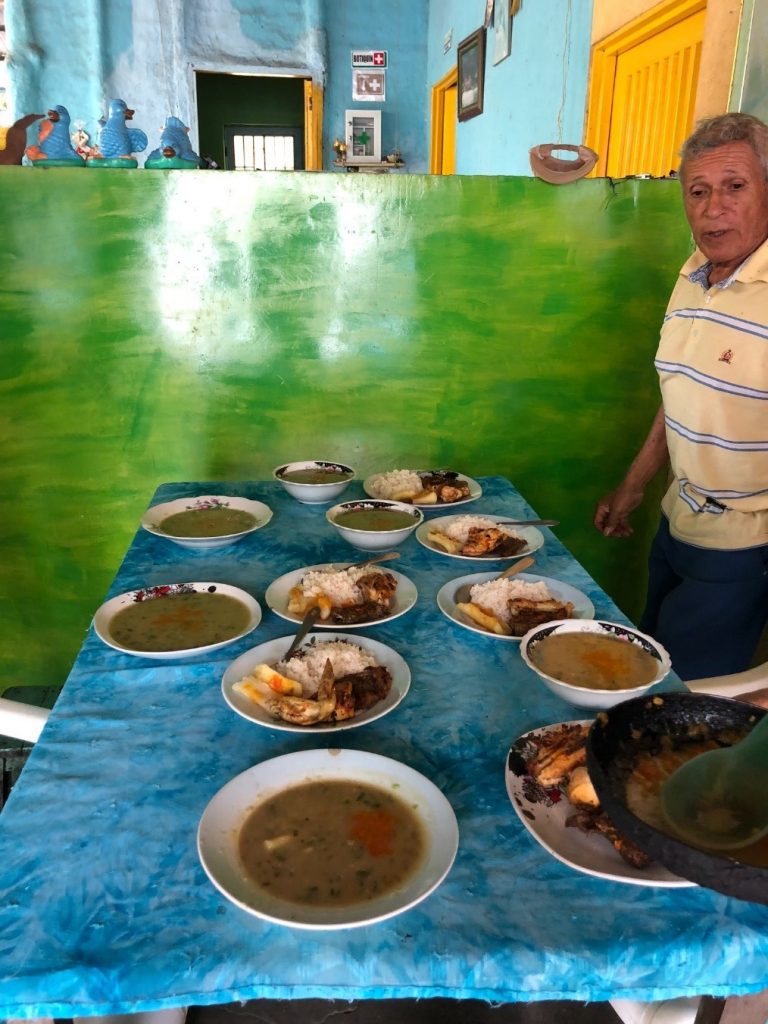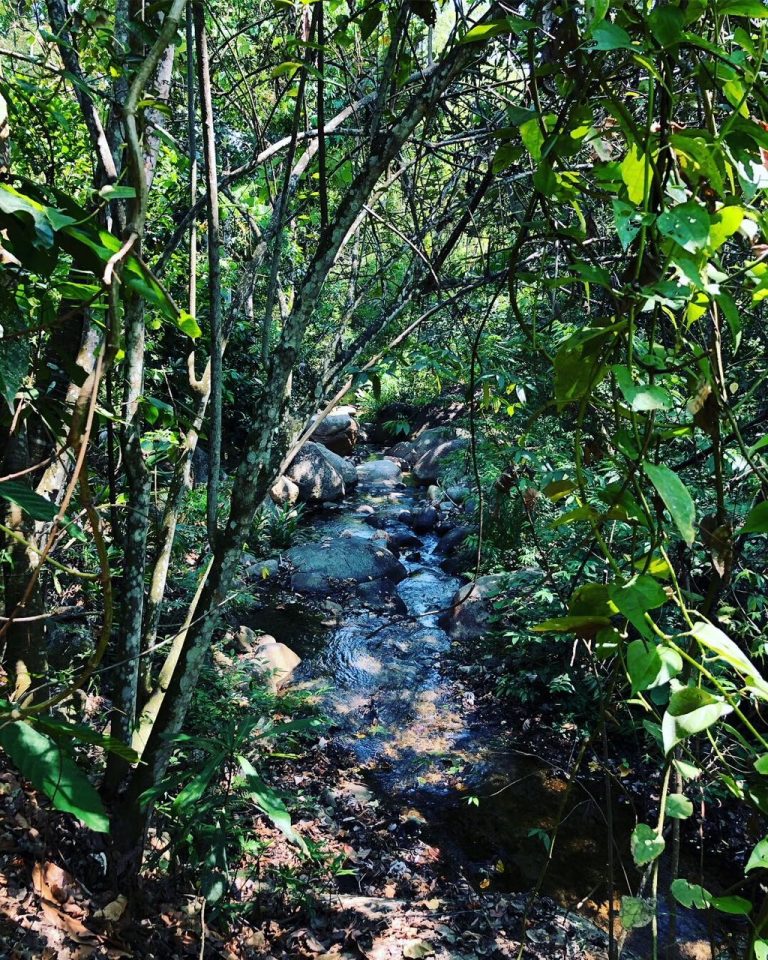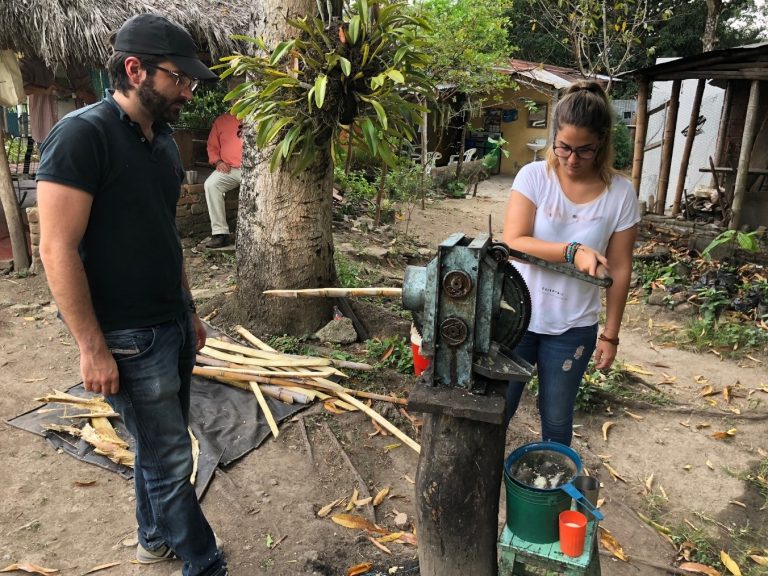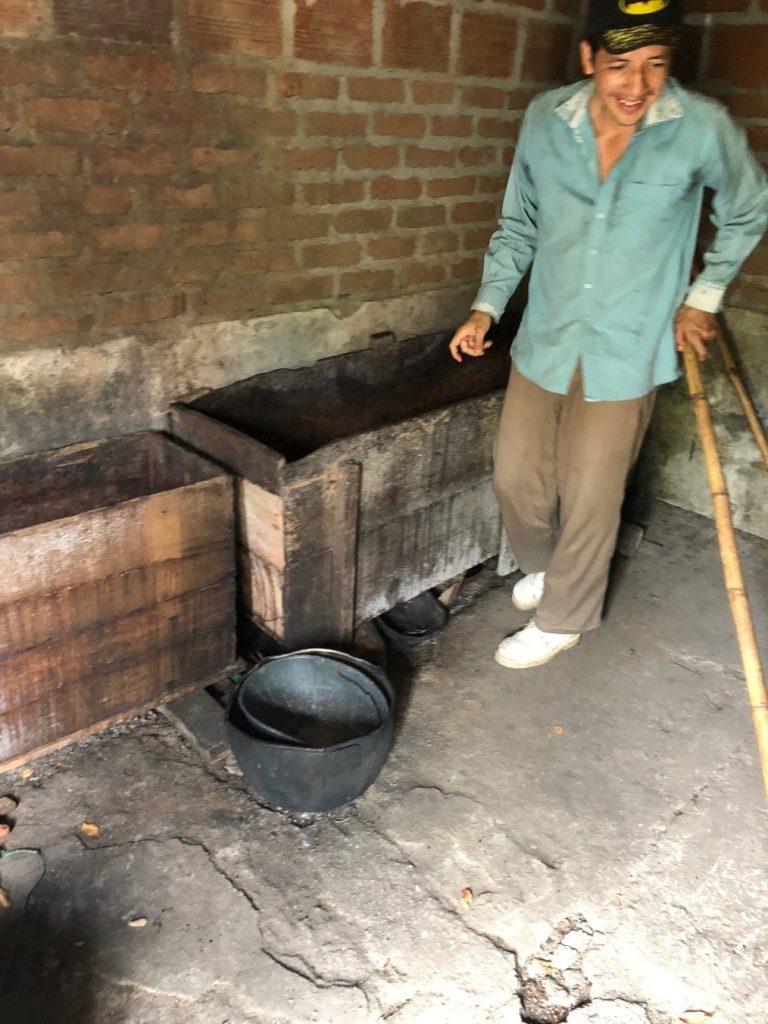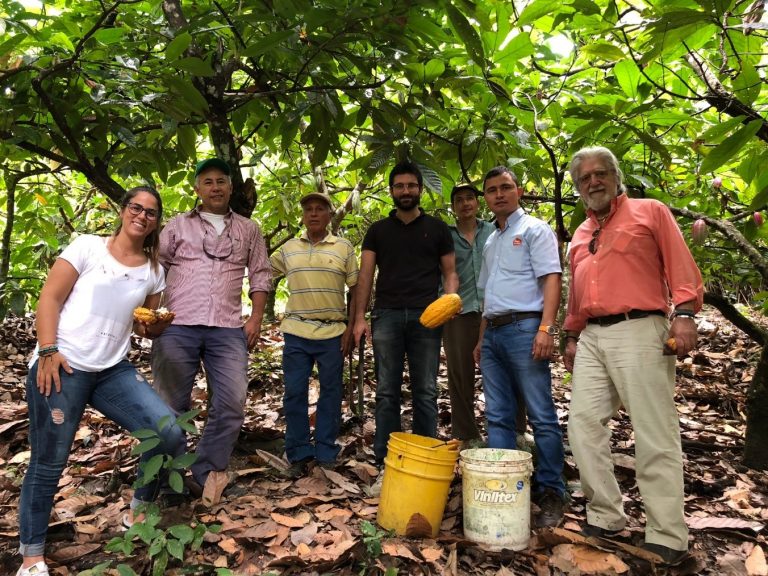Thank you, God, for the food before us today and for giving us the blessing of being able to enjoy it. We pray for those who do not have enough to eat, for the sick, for prisoners, and the kidnapped. We thank you for the opportunity to meet here today and for the presence of these doctors and engineers who have come to help us progress, to improve our countryside, our Luker’s farms, and our lives. Amen
Prayer of Don Jesús, cocoa Luker’s farmer in Huila.
Standing with his eyes closed, and holding hands with the people around him, this was the prayer that Jesus Augusto Gomez uttered aloud before inviting us to the table. The chicken sancocho had been prepared on a wood-burning stove as you could tell by its smoky taste, by the smell of wood in the air, and by the smoke blowing out from Doña Elvira Quintero de Gómez roof. The table was laid with a classic hand-woven tablecloth, very typical of Colombian peasant houses, with plates from different sets collected over the years and cutlery of different styles and shapes. The soup, the main course and a delicious agua de panela were arranged in each one of the 8 carefully placed spaces at Doña Elvira’s wooden table. In total, there were 11 of us, so after the prayer, Don Jesus, his wife Doña Elvira, and their son “El Mono”, moved to let the guests sit down and have lunch first. He said we were the priority. In spite of having worked all morning on his Luker’s farm harvesting cocoa under the Huila sun (Colombia), and at the age of 75, he refused to sit down as a gesture of hospitality.
The four of us from Bogotá were, in fact, complete strangers to this cocoa family. We had asked the associations ASOPROCAR and ASOPECA to take us to visit a Luker’s farm in the region, because we wanted to learn about their reality, live in their environment for a few hours, and spend time with them for no other reason than to listen to what they had to tell us.
I have to confess that when we arrived in Huila, I had no clear idea of how they were going to receive us. I thought that our visit would make them suspicious because it’s not a common thing to do. We had arrived suddenly hoping to get into a family’s personal space for an entire day in exchange for nothing. I thought they would refuse to receive us or ask us what we were really there for. What would happen if you suddenly arrive at a house in Bogotá and asked to stay there all day? To my surprise, we were greeted with a big smile and contagious kindness.
After a short conversation to welcome us and to show us around the place, we went out into the 3-hectare cocoa plantation with very tall, old trees, with thick trunks, a typical characteristic of the area’s very traditional agriculture and practices. Don Jesus was walking with some difficulty, as he had an accident when he was young that injured his leg. He didn’t complain, but we could see that it was difficult for him to walk. He then told us that he had had five strokes, but that he was still working as usual. During the tour, he spontaneously told us anecdotes about his life. To the left of the path where we walked, there was a ravine with crystalline water, with huge stones and leafy vegetation. The shade of the cocoa trees and the sound of the ravine made for a cosy atmosphere that served as the backdrop for a conversation of about 2 hours. We learned about how Don Jesus managed his estate. Although he did not know for sure how much he produced, nor did he have any figures written down, he knew his trees like the palm of his hand.
After lunch where we were treated with so much hospitality, we spent time with the family who taught us how to prepare guarapo, a typical Colombian drink made with sugar cane juice. In the courtyard, they had an old cane-chopping machine. “El Mono” had already cut some of these plants that were ready to be put through the machine to extract the juice. We all helped, and in the end, obtained about 5 liters of guarapo. Tired out by the afternoon activity, we went to the kiosk where Don Orlando, leader of the cocoa association, who works with Don Jesus, invited for a brandy after dinner.
At the kiosk, Don Jesus told us more stories about his life, one of them about his leg accident. He told us that at the age of 20, he was chasing a girl he liked. One night, he wanted to go out on his horse to look for her. His mother warned him not to go out, that it was too late and that it was not the right thing to do. He went out anyway and fell from his horse, which almost left him disabled. The moral he had to share with us, in the end, was: “A mother always knows what’s best for you. Always listen to your parents”. Just then, Guillermo Valderrama, our 65-year-old-consultant, added, “That’s right, he who doesn’t listen to his mother, doesn’t listen to God’s voice”.
He also told us about how he had stopped drinking alcohol in his old age, thus losing many of his friends. He told us about his childhood secrets and his indelible memories of the era of bipartisan violence between liberals and conservatives – two Colombian political parties – during the 1950s. He told us how he saw many people die near the farm where he grew up and about the recent violence. At 75, he recounted these memories as if they had happened yesterday. His trauma was evident, but his conviction for the value of work, the countryside, agriculture, and peaceful community life was also strong.
As we were about to leave, “El Mono”, who had a mental disorder due to having drunk adulterated alcohol and who had been feeling depressed and lonely lately, told us: “thanks to your visit, my farm looks even more beautiful to me today”. Today has been an amazing and happy day for me. I learned more things than on any other day in the Bogotá office; I spoke with more empathy; I was more at peace; more human; happier; I hugged people I had never seen before; I enjoyed the tranquillity of the countryside; I met people who, despite not having been able to finish high school, knew more than I did; I was once again aware of the value of our countryside and of the human quality and drive of our peasants.
At Luker Chocolate, we will continue to work with them and for them, because it is they who make it possible for us to enjoy the food the earth gives us.
Those two weeks I spent with cocoa farmers in Huila marked my life as very few other things had. Pedro, Doña Carmen, Samuel, and Wilmer made me see that life in the countryside is very different from what I had experienced; it is more challenging, yes, but just as it challenges the land also inspires passion. It reconnects you with your roots and makes you grateful for the little things in life. For this reason, I want to continue to work towards developing the Colombian countryside through cocoa; I want to dignify the life of the farmers of my country and, above all, I dream of the day when all farmer children can have a quality future, so that their dream is to stay and work in the countryside and change the reality of our country.


 Share
Share
 Tweet
Tweet
 Share
Share

